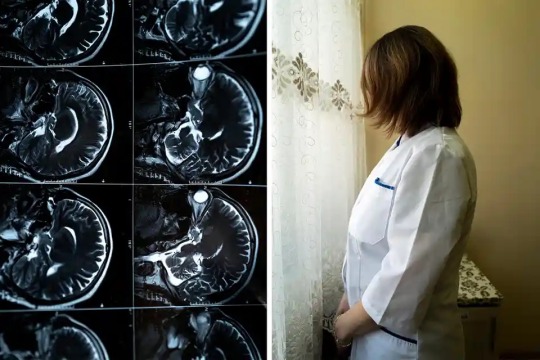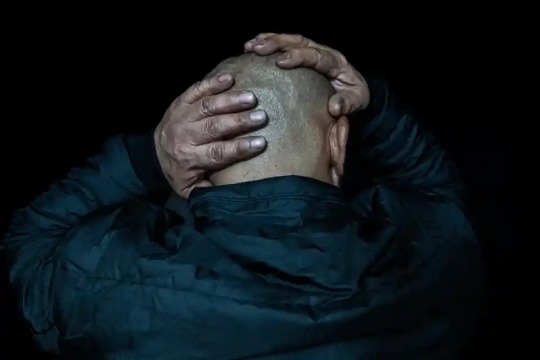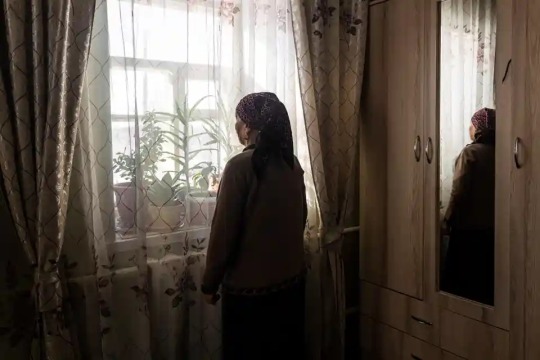#2017 week 40
Explore tagged Tumblr posts
Text
My house doesn't even have an AC at all. Whatever temperature it is outside, it is roughly that inside, give or take about 5-10 degrees (in both directions). Our only option is hoping it gets cold enough at night that we can lower the temperature of the house overnight.
We've had summers where it was 85-90F (29-32C) inside for days to weeks at a time :|
#before covid and inflation got out of hand we used to hang out at fast food restaurants on hot days#we do have a heater though which is nice when it gets down into the 40's during the winter#also this is AFTER we replaced all of our windows in like 2017 which helped immensely it used to be even worse#more recently than that we even got ceiling fans in most of the rooms! which also helps#unsurprisingly our house has basically no insulation#my room is above the kitchen so when my mom cooks on a hot day. I die.#there have been weeks at a time where I had to either move my PC downstairs or just not use it because it was too hot#PCs always put out more heat than you expect#lol even if we had an AC my mom probably wouldn't let us use it because of the cost even though she doesn't pay our utilities anymore#if it were an option I'd probably have it at 70-75 on days where it was hotter than that
14K notes
·
View notes
Text
Warren G featuring Nate Dogg - Regulate 1994
Warren G is an American rapper, record producer, and DJ known for his role in West Coast rap's 1990s ascent. A pioneer of G-funk, he attained mainstream success with the 1994 single "Regulate". He significantly helped Snoop Dogg's career during the latter's beginnings, also introducing him to Dr. Dre, who later signed Snoop Dogg. After the success of "Regulate", American singer and rapper Nate Dogg became a fixture in the West Coast hip hop genre, regularly working with Dr. Dre, Snoop Dogg, and Xzibit in the 1990s; his deep vocals became sought after for hooks, and he would expand to work with a larger variety of artists in the 2000s. As a featured artist, Nate charted 16 times on the Billboard Hot 100, and in 2003 reached number one via 50 Cent's "21 Questions". Nate Dogg also was notably featured on Dr. Dre's "The Next Episode" and Eminem's "'Till I Collapse" (poll #239). In 2015, Warren G released Regulate… G Funk Era, Part II, an EP featuring archived recordings of Nate Dogg, who died in 2011.
"Regulate" was released in the spring of 1994 as the first single on the soundtrack to the film Above the Rim and later Warren G's debut album, Regulate… G Funk Era. The album debuted at number 2 on the US Billboard 200 chart, selling 176,000 in its opening week. The single spent 18 weeks in the Top 40 of the Billboard Hot 100, with three weeks at number 2, and earned a Grammy nomination and a MTV Movie Award nomination. In 2017, "Regulate", certified platinum in 1994, went multi-platinum, propelled by digital downloads.
It employs a four-bar sample of the rhythm of Michael McDonald's song "I Keep Forgettin' (Every Time You're Near)", and also samples "Sign of the Times" by Bob James and "Let Me Ride" by Dr. Dre. "Regulate" starts with a read introduction referencing dialogue from the 1988 film Young Guns.
"Regulate" received a total of 75,7% yes votes! Previous Warren G polls: #20 "Prince Igor".
youtube
827 notes
·
View notes
Text
The Affliction
When I walked across a room I saw myself walking as if I were someone else, when I picked up a fork, when I pulled off a dress, as if I were in a movie. It’s what I thought you saw when you looked at me. So when I looked at you, I didn’t see you I saw the me I thought you saw, as if I were someone else. I called that outside—watching. Well I didn’t call it anything when it happened all the time. But one morning after I stopped the pills—standing in the kitchen for one second I was inside looking out. Then I popped back outside. And saw myself looking. Would it happen again? It did, a few days later. My friend Wendy was pulling on her winter coat, standing by the kitchen door and suddenly I was inside and I saw her. I looked out from my own eyes and I saw: her eyes: blue gray transparent and inside them: Wendy herself! Then I was outside again, and Wendy was saying, Bye-bye, see you soon, as if Nothing Had Happened. She hadn’t noticed. She hadn’t known that I’d Been There for Maybe 40 Seconds, and that then I was Gone. She hadn’t noticed that I Hadn’t Been There for Months, years, the entire time she’d known me. I needn’t have been embarrassed to have been there for those seconds; she had not Noticed The Difference. This happened on and off for weeks, and then I was looking at my old friend John: : suddenly I was in: and I saw him, and he: (and this was almost unbearable) he saw me see him, and I saw him see me. He said something like, You’re going to be ok now, or, It’s been difficult hasn’t it, but what he said mattered only a little. We met—in our mutual gaze—in between a third place I’d not yet been.
Marie Howe in Magdalene, 2017
219 notes
·
View notes
Text
Since 2014, millions of Uyghurs, Kazakhs and other minorities have been locked up in China and subjected to torture and forced labour. Some of those freed talk about trying to rebuild their lives in neighbouring Kazakhstan.
Photography by Robin Tutenges

A Chinese course book
Saliman Yesbolat used to live in Ghulja county, Xinjiang. After she refused to denounce her Uyghur neighbours to the police, she was forced to perform the raising of the Chinese flag every Monday at dawn, and to attend Chinese lessons twice a week in the basement of her building, where she would learn the Chinese language, patriotic songs and Xi Jinping's discourses by heart. This is her exercise book.

Forced to leave China
At 65, Imam Madi Toleukhan is one of the oldest refugees in Bekbolat, Kazakhstan, where more than 100 families took shelter after fleeing the Chinese regime. 'We were richer back there. I owned a herd, but I was too afraid for my sons, my grandchildren and their future: I came to Kazakhstan to save them. I didn't want them to be the fourth generation to suffer at the hands of the Chinese government, he says.

Remembering Uyghur culture in exile
Two members of the Dolan Ensemble, a Uyghur dance troupe based in Kazakhstan, get ready before performing a traditional dance to mark 40 days since the birth of a baby. Founded in 2016, the troupe performs at festivals or private events that bring together members of the Uyghur community, some of whom have had to leave Xinjiang.

Torture, infertility and damaged genitalia
In Kazakhstan, medical care for camp survivors is poor. Most victims can barely afford to see a family doctor. Anara*, an endocrinologist in a Kazakh hospital who has examined about 50 camp survivors since 2020, noticed recurrent infertility problems among her patients. 'Men or women, many have damaged genitalia. Some told me they'd been given drugs, others said they'd been raped. As they didn't come to us right after being released from the camps, it's impossible to know what kind of drugs they were administered in Xinjiang, she says. *Not her real name

The tiger chair
Ospan* spent a year in a re-education camp. He says his mind and body were crushed by the tortures he experienced in a tiger chair - a steel apparatus with handcuffs that restrains the body in painful positions. Aged about 50, this former shepherd, who took refuge with his family in eastern Kazakhstan, is no longer fit for work. Physically wrecked and prone to headaches, he mourns the loss of his memory above all. 'I used to know a lot of songs and I loved to sing; I also knew poems by heart ... Now, I can't sing any more, I can't remember the words,' he says. *Not his real name

Broken families and imprisonment
Aikamal Rashibek saw the dreadful efficiency of the CCP's brainwashing on her husband, Kerimbek Bakytali, after he was released from a Chinese psychiatric hospital. 'He disappeared for a year. When he came back, he didn't tell me anything about what happened to him. He was highly unhinged, always nervous, and got angry whenever I asked questions. He couldn't stop repeating that he hated Kazakhstan now, and that he wanted to go back to China with the kids to give them a Chinese education, says Aikamal. They are now separated.

Missing loved ones in China’s camps
In March 2017, Miyessar Muhedamu, left, a Uyghur woman, was arrested in Xinjiang under the pretext that she had studied Arabic in Egypt when she was young. Her husband, Sadirzhan Ayupov, right, and her three children have not seen her since. Now that Miyessar has left the camp, Sadirzhan receives a short call every few months. He suspects she might have suffered abuse, yet Miyessar can’t speak freely. ‘She told me she’d been in a re-education camp, and that she’d been released. When I ask her what she went through there, she doesn’t answer,’ says Sadirzhan.

Life after fleeing China
Sent to a re-education camp in 2018 at the age of 64, Yerke* saw her health quickly deteriorate. Locked a tiny cell with dozens of other women, she almost lost the use of her legs due to the cold floor she had to lie on. She was in the camp when she learned of her son’s death: pressured by the Chinese authorities, he took his own life. After her release, Yerke fled to Kazakhstan with some family members, but two of her children remain in China. *Not her real name

Forced labour and confessions
Dina Nurdybay, 32, was arrested in Nilka county, Xinjiang, because her traditional Kazakh clothing business made her a separatist, according to the Chinese authorities. She spent 11 months between two re-education camps, a CCP school and a forced-labour sewing factory. After proving she was capable of being ‘well behaved’ and having performed a self-criticism in front of the whole village, Dina was released and managed to escape when she obtained a week’s leave to visit her ailing father in Kazakhstan.

Cultural genocide
China’s repression of ethnic minorities also involves cultural genocide. As Muslim rituals are forbidden in Xinjiang, people are trying to keep their traditions alive across borders. Here, a family is praying together in Kazakhstan after the death of one of their relatives in Xinjiang. They could not repatriate the body because the border between the two countries was closed at the time.
(continue reading)
#politics#uyghur genocide#islamophobia#china#cultural genocide#uyghurs#photojournalism#genocide#uyghur refugees#kazakhstan
449 notes
·
View notes
Text
Version that doesn't require sign-in.
"Hot Labor Summer just became a scorcher.
[On August 25, 2023], the National Labor Relations Board released its most important ruling in many decades. In a party-line decision in Cemex Construction Materials Pacific, LLC, the Board ruled that when a majority of a company’s employees file union affiliation cards, the employer can either voluntarily recognize their union or, if not, ask the Board to run a union recognition election. If, in the run-up to or during that election, the employer commits an unfair labor practice, such as illegally firing pro-union workers (which has become routine in nearly every such election over the past 40 years, as the penalties have been negligible), the Board will order the employer to recognize the union and enter forthwith [a.k.a. immediately] into bargaining.
The Cemex decision was preceded by another, one day earlier, in which the Board, also along party lines, set out rules for representation elections which required them to be held promptly after the Board had been asked to conduct them, curtailing employers’ ability to delay them, often indefinitely.
Taken together, this one-two punch effectively makes union organizing possible again, after decades in which unpunished employer illegality was the most decisive factor in reducing the nation’s rate of private-sector unionization from roughly 35 percent to the bare 6 percent at which it stands today...
“This is a sea change, a home run for workers,” said Brian Petruska, an attorney for the Laborers Union who authored a 2017 law review article on how to effectively restore to workers their right to collective bargaining enshrined in the 1935 National Labor Relations Act, which was all but nullified by the act’s weakening over the past half-century. Taken together, Petruska added, last week’s decisions recreate “a system with no tolerance for employers’ coercion of their employees” when their employees seek their legal right to collective bargaining...
Since the days of Lyndon Johnson, every time that the Democrats have controlled the White House and both houses of Congress, they’ve tried to put some teeth back into the steadily more toothless NLRA. But they’ve never managed to muster the 60 votes needed to get those measures through the Senate. The Cemex ruling actually goes beyond much of what was proposed in those never-enacted bills."
-via The American Prospect, August 28, 2023
--
Note: I didn't include it because the paragraphs about it went super into the weeds, but the reason all of this is happening is because of the NRLB's general counsel, Jennifer Abruzzo, who was appointed by Biden. In fact, according to this article, this "secures Abruzzo’s place as the most important public official to secure American workers’ rights since New York Sen. Robert Wagner, who authored the NLRA in 1935." Voting matters
#labor#labor rights#labor unions#workers rights#unions#unionize#nlrb#national labor relations board#biden#biden administration#united states#us politics#voting matters#american politics#organized labor#union busting#good news#hope#hope posting#hot labor summer#pro union
1K notes
·
View notes
Text

Tally Ho / Aladdin / Planet Hollywood
Aladdin opened in 1966 with one of the Strip's first neon-enhanced porte-cochéres, a freestanding sign featuring a revolving, three-sided marquee, topped with an "Aladdin's Lamp," designed and fabricated by YESCO.
Tally Ho ('62-'65)
'61: Edwin S. Lowe announces plans for Tally Ho non-gaming hotel. In the 40s the land was owned by locals Salton, Rose, and Goldberg. (Alexander & Rebecca Salton, founding members of the Las Vegas Jewish community.)
'62: Dec. 24, Opening of Tally-Ho, hotel and country club with 9-hole golf course. 322 of the 450 rooms open during “preview opening” in Dec. The hotel was alternately spelled Tally Ho, Tally-Ho, and Tallyho.
'63: Oct. 11, Tally Ho closed. “Ed Lowe made no excuses … admits he was dead wrong about a no gambling luxury hotel.” (Hertz, RJ 10/13/63)
'63: Oct., Norman Kaye and Frank Windsor operate the Tally Ho golf course.
'63: Oct.-Dec., The hotel is sold to Kings Crown Inns of America, represented by Floyd and Beryl Cook, Donald Bolinger (Cooks Brothers Trusts, Indiana). Under lease to operators Edward Nealis, Charles Luftig, and partners, Kings Crown Tally Ho's hotel, lounge, and restaurants reopen in Dec. (Duke, RJ 12/20/63)
'64: Construction of a showroom and casino begins in Fall, misses New Year's Eve opening deadline. The showroom and casino are completed in '65, ultimately never opened. (RJ 4/8/64, RJ 5/18/65)
'65: Nealis heads 18 casino applicants of Tallyho Operating Co. who are unable to get approval from Nevada Gaming Control Board (GCB). In later years Jimmy "the Weasel" Fratianno of the Los Angeles crime family claimed he owned a piece of the Tally Ho and was to run the casino. (AP 2/17/65, RJ 11/25/84, Mob Museum 12/8/2017)
'65: Apr. 1, Tally Ho closed for the second time after King's Crown files suit against Tallyho Operating Co. for unpaid rent. Tenants are evicted, property put in control of the owners.
'65: Dec., Tally Ho bought by Milton Prell (Prell Hotel Corp.) from The Cooks Brothers Trusts.
Aladdin ('66-'97)
'66: Aladdin announced. Drawings for redesigned casino and proposed hotel tower unveiled early in the year. Martin Stern, architect. (RJ 1/2/66, RJ 1/17/66)
'66: Mar. 31, Aladdin opened. Freestanding sign and the Strip's first neon-enhanced porte-cochère by YESCO. Primary owners M. Prell, G. Gilbert, and S. Krystal, all former members of Sahara-Nevada Corp. Comedian Jackie Mason opens the 500-seat Baghdad Theatre.
'66: Dec., Prell stops $75k/month payments on the Aladdin and asks that the price be cut. The trustees agree to reduce the sale price to $5.5M. (Dayton, 4/20/72)
'67: Sep. 26, Milton Prell suffers a debilitating stroke which removes him from Aladdin management. (Dayton, 4/20/72)
'68: Apr., Stockholders of Prell Hotel Corp. vote to merge with Parvin-Dohrmann Co., leading to Parvin-Dohrmann take-over the Aladdin.
'68: Jun., Parvin-Dohrmann operation of Aladdin’s casino approved by GCB. (RJ 6/20/68)
'68: Sep., 28, "after the stock trade was finalized, Milton Prell, by this time paralyzed, was told by the new management he had two weeks to get out of the Aladdin." (McKnight, Alexander. Journal Herald, 4/20/72)
'70: Parvin-Dohrmann adopts the new name Recrion, and strips the firm of all its holdings except for its three Las Vegas hotel-casinos: Aladdin, Fremont, and Stardust.
'71: Oct.-Dec., Recrion announces sale to Sam Diamond, P. Webbe, R. Daly, D. Aikin as Aladdin Hotel Corp. Diamond announces plans for hotel tower.
'71: Entertainment director James Tamer is involved in secretly managing the casino and directing the skim, according to later conviction.
'74: Aladdin investigated by GCB for issuing comps to organized crime figures.
'74: Groundbreaking for the “Tower of Majesty” high-rise, and theater. Lee Linton, architect. Years later in '83, Linton and Aladdin attorney Sorkis Webbe are each convicted of tax fraud in relating to a kickback scheme during the '74 expansion.
'76: Jul., Tower and Theatre for the Performing Arts opened; new porte-cochère by Charles Barnard, Ad-Art; original sign replaced; all financed by Teamsters Central States Pension Fund loan.
'76: Mae Ellen George buys 24% of the hotel, relying on advice of Tamer.
'78: Aug. 3, Detroit federal grand jury indicts Tamer, Aladdin GM James Abraham, Aladdin casino manager Edward Monazym, and Charles Goldfarb (denied a license in ’71) of conspiring to allow hidden owners to exert control over the resort. Owners of the Aladdin at this time are Webbe (34%), Diamond (23%), Mae George (19%), Daly (14%), John Jenkins (8%), and George Morse (2%). (RJ 8/3/78)
'79: Mar. 13, Tamer, Abraham, Monazym, and Goldfarb convicted.
'79: Aug., GCB closes the resort; U.S. District Judge Claiborne opens it hours later, “until a mob-free buyer could be found.” (German, RJ 9/20/2021.)
'80: Jan., Ed Nigro gains a court-sanctioned takeover of the Aladdin after he and Johnny Carson sign an agreement to buy the property for $105M. The deal falls through.
'80: Jul. 10, GCB revokes Aladdin's license and the casino is closed; hotel remains open.
'80: Oct. 1, Casino is reopened after Ed Torres and Wayne Newton buy the Aladdin for $85M.
'82: Jul, Torres buys Newton's shares of the Aladdin.
'84: Feb., Aladdin placed under bankruptcy protection after a Teamsters Pension Fund forces foreclosure.
'85: Jan. 22, Ginji Yasuda buys the Aladdin for $54M; casino closed during Yasuda licensing.
'87: Apr. 1, gaming reopens.
'89: Aug., Yasuda, failing to reveal the source of millions in loans, loses his gaming license; Aladdin forced into bankruptcy.
'89: Sep., Court appointed trustee Jack Fidelman, and WDT Associates (Wm. and Tim Dougall, Larry Bertsch) take over operating the hotel. Aladdin remains in bankruptcy through the early 90s.
'91: Jun., Property title transferred to Bell Atlantic Tricon Leasing Corp when no buyers meet the minimum bid.
'92: Jun., Aladdin emerges from 3-year bankruptcy, control is given to Joe Burt and his JMJ management team on a 12-year lease with Bell Atlantic Tricon.
'94: Dec., Jack Sommer, Signman Sommer Family Trust, buys the Aladdin for $80M. "When the family trust sold a major New York property in '94, Sommer needed to find a real estate investment for the proceeds to avoid substantial capital-gains taxes. The Aladdin was on the market at the time." (Simpson. RJ 8/13/2000.) Other potential buyers included Donald Trump.
'97, Nov 25: Aladdin closed. A new hotel-casino to be built on the 35-acre parcel.
'98, Apr 28: Aladdin tower demolished. Former Tally Ho rooms later demolished; Theater remains.
Aladdin (2000-2007) Planet Hollywood (2007-)
2000: New build of the Aladdin. Mall opens 8/17/00, hotel and casino delayed, opening 8/18/00. Cost: $1.1B.
2001: Sep., Aladdin files for bankruptcy.
2003: Aladdin sold for $635M to OpBiz investment group led by Planet Hollywood CEO Robert Earl. Sale finalized 9/1/2004.
2007: Apr. 17, renamed Planet Hollywood.
2009: Harrah’s Ent. purchases part of the $860M mortgage, takes full ownership in Feb. 2010. Harrah’s later rebranded as Caesars Entertainment.
Photos of Tally Ho | Photos of the Aladdin
Headline photo: Undated, circa '68, from The Magic Sign by Charles Barnard.

Circa Feb.-Mar. 1966: The hotel was open before the casino. Installation of the sign is beginning. Photo: Las Vegas News Bureau.




Mar. 1966: Sequence of photographs showing YESCO’s revolving, three-sided Aladdin pylon structure being pieced together by dual cranes ahead of their opening on the 31st. Ad-Art collection, from Charles Barnard’s The Magic Sign.

Undated, Las Vegas News Bureau.
Timeline sources. Previous landowners: C.D. Baker Map of Las Vegas Valley ’40; Alexander Salton. UNLV Special Collections & Archives.
Tally Ho: Tallyho Preview Attracts 3500. Review-Journal, 12/28/62; Tallyho Hotel Closes. Review-Journal, 10/11/63 p1; Murray Hertz. Future of Tallyho Raises Questions. Review-Journal, 10/13/63; Gordon Kent. Tally-Ho Hotel Sold. Review-Journal, 11/1/63; Forrest Duke. New Tallyho Sale Deal. Review-Journal, 12/20/63; Tallyho Plans $1 Million Show. Review-Journal, 4/8/64; Associated Press. Gaming Board Refuses Tallyho Casino License. Review-Journal, 2/17/65 p1; G. Kent, F. Duke. Strip Hotel Closes. Review-Journal, 4/1/65 p1; Tallyho Sues Owners. Review-Journal, 5/18/65 p1.
Tally Ho and Aladdin sales covered in a series by Keith McKnight and Andrew Alexander for The Journal Herald, Dayton OH. Welsh confirmed with crime figures. Journal Herald, 4/20/72; Firm with crime ties linked to casino deal. Journal Herald, 4/21/72.
Aladdin: Associated Press. Gamers Approve. Review-Journal, 6/20/68 p1; Associated Press. Firm adopts new name: Recrion Corp. Reno Gazette Journal, 12/14/70; Lou Miller. Aladdin Hotel sold. Review-Journal, 11/8/71; Jerry Ralya. New Aladdin Corporation seeks license. Review-Journal, 12/29/71; Aladdin execs indicted. Review-Journal, 8/3/78; AP. Las Vegas architect sentenced to prison. Review-Journal, 3/8/83; AP. Webbe convicted. Review-Journal, 6/19/83; Jane Ann Morrison. LV Casinos Targeted in Money Laundering. Review-Journal, 11/25/84; Aladdin Hotel's history spans 30 years. Review-Journal, 1/5/94 p3; Dave Palermo. Aladdin Hotel finally sells. Review-Journal, 12/9/94 p1; History. Review-Journal, 11/23/97 p14; Jeff Simpson. Aladdin owner faces music. Review-Journal, 8/13/2000; Chronology of the Aladdin hotel-casino. Las Vegas Sun, 8/18/2000. John L. Smith. Sharks in the Desert. Barricade Books, 2005; David Schwartz. Jimmy The Weasel Fratianno. themobmuseum.org, 12/8/2017; Jeff German. The Genie in the Lamp, and Close the Place Down. Review-Journal, 9/20/2021.
90 notes
·
View notes
Text
An air raid alert has just started when Victoria Itskovych joins a Zoom call from Kyiv. “It’s, like, a usual situation,” she says. “But really, it’s not usual.” February 24 will mark the second anniversary of Russia’s full-scale invasion of Ukraine. For nearly two years now, Kyiv has been under bombardment. Some weeks, people have to trudge to their shelters night after night, checking text alerts and Telegram channels to figure out where the missiles are falling and when it’s safe to come out—although, it’s never really safe.
That relentless stress, and the trauma of losing family, friends, and colleagues on the front, has taken its toll. A poll by the city government last year found that 80 percent of residents reported symptoms of post-traumatic stress disorder. Russia’s full-scale invasion of Ukraine has exposed the whole of Ukrainian society to battle shock. “We’ve all suffered from this,” says Itskovych, who is director of the Kyiv City Council’s IT department. “Almost every person has somebody who was injured or died during the war, or lost their home or lost their health.”
In the face of such widespread injury, the Kyiv government has turned to Ukraine’s now-famous civic tech infrastructure for help. As the war enters its third year, the municipal government is starting to build a citywide system for providing mental health support to citizens. It’s a vast challenge, but also a unique opportunity—the first time that such a mass-trauma event has happened to a society that has already built the tools of digital government. Dealing with the mental health impacts of the invasion will be absolutely vital to keep society resilient, functioning, and committed enough to repel the invaders. It’s also the key to Ukraine’s postwar recovery, laying the groundwork now for a society that can rebuild itself physically and psychologically from the horrors of war. “This is the future of our society,” Itskovych says. “We are building the basis for the resilience of the community itself.”
At the heart of the plan is the Kyiv government’s digital platform, Kyiv Digital, which it launched in 2017. Before the invasion, it was largely used to manage parking and public transport, and to notify residents of disruptions to services such as road closures or power outages. When the war began, those notifications became more urgent: incoming attacks, the locations of bomb shelters, and the safest routes to reach them. Like other parts of Ukraine’s civilian technology, the city pivoted its tools to keep people safe and support the war effort, bootstrapping and rewiring the systems at pace.
“The first changes to the notifications we did in hours,” says Oleg Polovynko, adviser on digitalization to Kyiv’s mayor. Since then, the digital teams have been engaged in a constant cycle of innovation, trying to figure out what services they can bring online. The war has pushed them to act more quickly, to adapt tools they have and invent things that don’t exist.
They’ve expanded tools for civic participation, letting citizens vote on petitions, send feedback to the city government, and ask for help, such as financial support to repair bomb-damaged homes. And they’ve collected a lot of data, which is how the Kyiv government has been able to measure the scale of the city’s distress—and people’s reluctance to seek help. Of the 80 percent of residents who show signs of trauma, “40 to 45 percent are afraid to have contact with doctors who can help,” Polovynko says.
But this is only half of the problem that needs solving. For those who do want to seek treatment, there simply aren’t enough resources to help them. Clinical psychologists are supposed to limit the number of patient consultations they do in a day, so they don’t burn out. Before the full-scale invasion, Inna Davydenko saw a maximum of four patients daily. Today, Davydenko, a mental health specialist at the City Center of Neurorehabilitation in Kyiv, sees twice that number. When we speak, she’s just finished a video call with a soldier stationed near the front, whom she’s helping cope with stress and anxiety.
Even before the war massively increased the number of people dealing with trauma, depression, and anxiety, Ukraine’s medical system suffered from an underinvestment in mental health provision. “In most hospitals, you have maybe one psychologist. In good hospitals, it’s maybe two,” Davydenko says. “A lot of people need psychological help, but we can’t cover everything.” There is simply no way that the current system can grow to match the enormous jump in demand. But, Davydenko says, “almost every Ukrainian person has a smartphone.”
This is exactly what Polovynko and Itskovych want to exploit, using Kyiv Digital’s platforms and data to digitize mental health support for the city, and so close the gap between need and resources. Their project will focus first on those they’ve identified as being most vulnerable—war veterans and children—and those most able to help others: teachers and parents. The next six months of the project will be a “discovery stage,” Polovynko says. “We need to understand the real life of our veterans now, of the children, of the parents, what’s their context, how they survive, what services they use.”
The project will track people through the process of recovering from trauma, monitoring the treatments they ask for and the ones they receive, their concerns as they move through the mental health system, and their outcomes. Once the team has a detailed map of services and bottlenecks, and data on what’s working and what’s not, they can match individual needs with treatments. A full roll-out is scheduled for early 2025.
“It doesn't mean that the whole chain of the service will be absolutely digital,” Itskovych says. Some patients may be directed to group therapy or one-on-one meetings with psychologists, others will be given access to online tools. The aim, she says, is to create efficiency, to close the service gap, but also to provide comfort, meeting people where they are. “For a big part of our clients, there is more comfort with getting the service online, in different ways. Some people are not comfortable meeting a specialist one-on-one; they prefer a digital way to get the service.”
The project is being supported financially and operationally by Bloomberg Philanthropies, a charitable organization created by former New York mayor and Bloomberg founder Michael Bloomberg. James Anderson, head of government innovation at the organization, says that the project comes at a critical time for Kyiv, where people continue to suffer even though global attention has shifted away to other crises.
“There's always a tremendous amount of attention when the immediate crisis hits,” Anderson says. “But mayors continue to have to deal with the human costs of crises, long after the newspapers have turned to new subjects. That’s certainly what we sense and see in Kyiv.”
The size of the challenge in Kyiv is clearly daunting. But, Anderson says, there are reasons for optimism. Cities have got better over the past two decades at responding to common crises, such as Covid-19, which also required rapid, mass digitization of services. “Every crisis is distinct and different, and awful, in its own way,” Anderson says, “but there are lessons learned.” The Kyiv government, and Ukrainian society more widely, have demonstrated a capacity for rapid innovation to meet urgent needs, and Anderson hopes that success in this project could see it replicated internationally. “This is not the last war. This is not the last crisis,” he says. “I think Kyiv has lessons that they can share with cities around the globe.”
For Kyiv, and Ukraine, the crisis won’t end when the war does. “Psychological health is the number one problem for Ukraine,” Davydenko says, before correcting herself. “Number one is Russia, number two is our psychological health,” she says. “PTSD is our future.”
124 notes
·
View notes
Text
Doctor Aphra reading guide 2025
we are nearing 10 years of having our favorite doctor in star wars! before A New Legacy comes out in a couple weeks with anniversary stories featuring Aphra, let's run down all her many many comics :)
(there are a few guides online, but mostly outdated or don't include everything i feel they should)
(includes Aphra's comics storyline. issues of other comics that feature Aphra as a cameo but don't really fit anywhere into her story are summed up at the end, same with non-comic material.)



Vader - Darth Vader (2015) issues 1-6
Shadows and Secrets - DV issues 7-12
Vader Down - Vader Down one-shot -> DV 13 -> Star Wars (2015) 13 -> DV 14 -> SW 14 -> DV 15
Rebel Jail - Star Wars (2015) issues 16-19
(optional) The Shu-Torun War - DV issues 16-19
End of Games - DV issues 20-25
Aphra - Doctor Aphra (2016) issues 1-6
The Screaming Citadel - The Screaming Citadel one-shot -> SW 31 -> DA 7 -> SW 32 -> DA 8
The Enormous Profit - Doctor Aphra Annual 1, DA issues 9-13
Remastered - DA issues 14-19
The Catastrophe Con - DA issues 20-25
Worst Among Equals - DA issues 26-31, Doctor Aphra Annual 2
Unspeakable Rebel Superweapon - DA issues 32-36
Rogue's End - DA issues 37-40, DA Annual 3, The Empire Ascendant one-shot
Fortune and Fate - Doctor Aphra (2020) issues 1-5
The Engine Job - DA issues 6-9
War of the Bounty Hunters - War of the Bounty Hunters 1 -> DA issues 10-11 -> WotBH 2 -> DA 12 -> WotBH 3 -> DA 13 -> WotBH 4 -> DA 14-15 -> WotBH 5
Crimson Reign - DA issues 16-21
The Spark Eternal - DA issues 22-25
Ascendant - DA issue 26 -> Revelations (2022) -> DA issues 27-29 -> Hidden Empire 5 -> DA issues 30-31
Ripple Effect - DA issues 32-34
Dark Droids - DA issues 35-40, Tall Tales story in Revelations (2023)
(War of the Bounty Hunters, Crimson Reign, Hidden Empire and Dark Droids are all bigger crossover events as well, which can optionally be read in their entirety. all content relevant to Aphra is included here.)
(for big-picture timeline purposes: arcs 1-14 take place between A New Hope and The Empire Strikes Back; arcs 15-22 between The Empire Strikes Back and Return of the Jedi.)



additional Aphra-featuring issues outside this timeline:
flashbacks in Galaxy's Edge issues 3-5, set sometime between Vader and Remastered.
Bounty Hunters (2020) issue 1, set sometime between Rogue's End and War of the Bounty Hunters, probably around Fortune and Fate. conflicts with pre-established character dynamics a bit.
Darth Vader (2020) issues 35-36, set sometime between Ascendant and Dark Droids.
Dark Droids issue 5, difficult to reconcile with the rest of the Dark Droids Aphra arc, but taking place during it.
Battle of Jakku: Republic Under Siege issues 1-2, set after Return of the Jedi and thus after everything in this guide.
extremely minor cameos and mentions in other comics:
multiple flashbacks in Sana Starros miniseries (issues 1, 2, and 5)
mention in Star Wars (2015) issue 61
non-comic media starring Aphra (recommended for sure but outside this reading guide):
The Trigger - short story from the anthology From a Certain Point of View (2017). takes place shortly before Vader.
Doctor Aphra audio drama and/or its script (2020) - adapts the first six arcs of this guide, with additional material, including backstory aspects that are later incorporated into Aphra's comics.

22 notes
·
View notes
Note
You're my new favorite blog! You have no idea how I wish I could peck inside your brain like a chicken. 😭😂😂 I am a Catholic and a recovering agnostic. I struggle with letting go of my old way of life and philosophy constantly, I have been struggling with it since the day I decided to revert - that was back in 2017. (I think you would like to know my journey back to the Faith started after watching HBO's The Young Pope! 👌🏼) At this point I don't know if I'll ever be the person the Lord wants me to be, oh well, I'll die trying and I know that will mean something.
I just know I can't go back to being a non-believer, because as Carl Young said, now I don't just believe, I know. The irony is my struggle to believe in something I know to be objectively the Truth.
I have a question for you though, actually I hope for some advice from you. How do I reconcile with the reality that I haven't become who I dreamed to become (like career wise), but now that a new career has been shoved upon me (a career my parents wanted for me - and they valued safety and stability over "following my dreams" I suppose)? ...which isn't necessarily a bad thing, because it is an extremely noble profession and it pays quite well.
The thing is, as much as I try to accept my new career, I keep telling myself and to others that I'm doing this for my parents and not because I want to be here. I feel terrible about it. But, again, it's not like I am unfulfilled (I am unhappy though, but that comes with the work culture/environment, I feel like I am surrounded by 40+ year old teenagers); as a matter of fact, I do think I know - objectively - in my heart that this is exactly where the Lord wants me to be? But I keep fighting against it, keep struggling against this sense of vocational calling that I'm feeling towards my new job, instead I desperately wanna give into my want to go "live the life I want." Like throw this all away, get new training and start all over with the career I wanted all those years ago.
I want to be better, to be sacrificial like Christ on the Cross. I've always known I had a little depression (comes with my disability from a young age and this whole dream thing); I have been suicidal over this, I actually used to joke with myself that I'd kill myself if I don't achieve my professional goals by the time I turned 25. I will turn 30 this September and even though I haven't been literally dead, I feel like I've been in a vegetative state - mentally - ever since the day I turned 25. I hope that makes sense.
I started seeing a therapist 2 weeks ago since my mental health started affecting my new job - she did say I have depression and is trying to help me but I just don't know if I want to be helped at all, because I am unable to do the exercises she tells me (like create a routine, exercise well, write down good thoughts, etc.) I feel like I'm failing myself, my parents and, most importantly, my Heavenly Father.
I apologise if this is nonsensical, I apologise for dumping all of this on you - random stranger on the internet - but idk I felt like maybe you'd have something wise to tell me to knock some sense into me (without a bump to prove it hehe).
Thank you and God bless! 🥰
You’re very kind, and I’m glad you feel comfortable enough to share all this with me! I really never have anything good of my own to say, or any wisdom to offer, except what I “steal” from God…and I guess what I mean is, if I ever say anything helpful or good or true, I’m just the messenger. I didn’t come up with it. On my own I have zero wisdom or good things to offer.
Anyway, I was surprised reading this because I have gone through (been going through) a similar sort of mindset. I went to school for the career I dreamed about (still dream about) and I worked hard and I wanted it more than anybody around me (very Mike Wasowski in MU of me) and it hasn’t happened the way I planned, or in my timetable.
I mean, in all humility: I work with a studio making a tv show, but it hasn’t got off the ground yet, and I work for a company that writes movie reviews, but neither of those things pay my bills. I have a third job, working with therapists, that’s nothing like what I always wanted to do. That’s my “career,” but it’s not the career I’m passionate about and working toward. And I wonder if I’ll ever do anything “major” in the line of work I love and went to school for. And when I do, I have gotten into some really dark mental places.
Forgive me for not using the words “depression” or “suicidal.” I hate using those words because they’re overused and romanticized and flooding the culture. But more importantly I hate using them because the only thing I identify with is Christ, not any mental struggle I try to slither back into, like a snake trying to put back on old skin. I’m not my overthinking—I’m not my depression—I’m not my suicidal thoughts or emotions—I am one with Christ. Those are things inside me that are defeated and dead—the teeth have been knocked out of them. They just gum me from time to time. So I want you to know I empathize with you, but that’s my point and that’s how I want to answer you:
The only thing about you that really matters is Christ.
Who He says you are, what He has done and how He lived, which is applied to you because He said it is, by grace alone, through faith alone. No matter how you feel.
And I say that to you, as the answer, because I think you and I focus too much on what could be and what “should be” as if God has a set path for us, and if we don’t figure out what it is and walk it, we’ll have a less-fulfilling life. “If I stay at my therapy job and just work with teenagers and write on my blog for the rest of my life, I’ll be fine, but I won’t be as good as I could be.” Or for you. “If I stay in this career I’m in, the one my parents backed me into, I’ll make it, I’ll be fine, but I’ll never be as happy as I want to be.” We’re both thinking, every once in a while, “This is career is what God wants for me, and all my misery is coming from not submitting to it, and if I could just wrestle my contentment into place and give up the thing I want, and submit to what God wants, I’d be fulfilled.”
But how do we know any of those thoughts are true? How do we know God wants us in these boring old careers we wouldn’t have chosen—didn’t choose? Or, how do we know these boring old careers are what we’re stuck in because we didn’t take the plunge and work harder for our “dreams,” which were what He really wanted us to do? How do we know either of those things?
We don’t. We don’t get to know. That’s the point.
Because that’s not how God works. Not from what I can tell in the Bible.
“And whatever you do, whether in word or deed, do it all in the name of the Lord Jesus, giving thanks to God the Father through him.”. Colossians 3:17.
Whatever you do. Not “the one specific thing you figure out He wants you to do.”
My mom described it to me once when I was in a really dark place trying to figure out what He wanted me to do, paralyzed with indecision, afraid He wanted me to do something I just didn’t want to do, like this: “God doesn’t hold out one flower and say, ‘this is the one I want you to have, so you can either take it or take something worse.’ God makes a field of flowers, and He says, ‘Which one do you want? Pick one, and do it with excellence for Me.’ Then just trust Him to make it good.”
It sounds like you’re in a career, but you are wrestling with whether or not to pick it, now that you have some autonomy as an adult, or to pick starting over. Well. Pick one. Just pick one. And trust God to take care of you. Trusting God looks like thinking it through with excellence, then making the decision—and making the decision means letting go of worrying about the thing you didn’t pick. “Take every thought captive in obedience to Christ.” Once you make a choice, make it all the way, and don’t let your mind wander anymore to “what if this blows up in my face? What if I should’ve stayed back there at the crossroads, or gone down the other path?” It’s going to be hard and God is going to take care of you, no matter what you pick. So don’t let your mind go to those places where you worry; acknowledge the worry, and every time, ask God to help you remember that He’s got you.
Because here’s the point, here’s the thing: He does have you. Because ultimately, your career really doesn’t matter. It doesn’t, it doesn’t, it doesn’t. Neither does your dream. Not ultimately. And now I’ll say “our” because I need to hear it too. Our dreams and careers are not the point of us, and our dreams and careers are not what God means when He says “I’ll take care of you.”
What He means is, “I’ve already taken care of you.” Because the most important thing isn’t our job or our dream. The most important thing is, we’ve been rescued out of eternally being trapped in our broken desires, and now we get to live for Christ, Who is the Way, the Truth, and the Life. That’s the major. And that truth is where our fulfillment is supposed to come from, what our lives are meant for, our purpose. As long as we pick one, and do it with excellence to make the name of Jesus famous, with that goal in mind, we’ll be emotionally fulfilled. We’ll be satisfied. Because that’s the goal. Not making movies, or whatever it is you want to do. Not having secure means of living. Just…living our lives to make who Jesus is famous. We can do that wherever.
So then the choice? It becomes a minor, not a major, and the pressure of “will I be happy?” is off, because happiness isn’t found in that stuff. And whenever I forget, and start looking for happiness in my dreams, goals, career, that’s when it all starts to feel dark and stressful and hard and crushing. Because it was never meant to give me happiness or fulfillment—that’s a need only Christ can fulfill.
Don’t misunderstand me. He cares what you do. He cared about every decision you make, and He does have a plan. But that’s going to happen anyway. So just pray, consider which option is a) wise to go for and takes care of the responsibilities God has entrusted you with, b) which option you genuinely want, when your wants are not influenced by fears, and then c) step out and do it in faith. And do it with the mindset of, “I’m doing this, and I’m not thinking about the alternative if I can help it, and I’m also not putting all my happiness-eggs in this basket, because even if it crashes and burns, hey, I’m still one with Christ and I can still make Him famous no matter what road my career goes down.”
I hope this helps. It’s a subject I’m hamster-wheeling around in my mind right now a lot—but when I just fix my eyes on Christ and think about how the most important things, the things that give real joy and happiness, are already and forever taken care of and I can’t mess them up—then can get off the hamster wheel and enjoy the life He’s given me, right now, today, without worrying about the future.
49 notes
·
View notes
Text

THREE TOWNHOUSES
lot type - house
size 40 x 30
unfurnished






I've had some free time to build another London inspired townhouses for Willow Creek and here they are!
Totally unfurnished so feel free to put some magic with interiors..
Basically used costum content by @felixandresims, @pierisim and @harrie-cc, full list down below..
Gallery id: JakkuuSim
Felixandre cc:
berlin
london
georgian
colonial
paris
kyoto
florence
ghotic revival
schwerin/petit - jauary 2018/september 2017
Hey_Harrie cc:
brownstone
re-color of bougainvillea
Harrie and Felix collab cc:
bafroom
Pierisim cc:
domaine du clos
maison meuliere
winter garden
oak house
WyattsSims cc:
basegame trashcan recolors + recycling
Amoebae cc:
plastered style walls
Have a great week!
#sims 4 house#sims4house#sims4#sims4cc#sims4 build#ts4#showusyourbuilds#london#exterior#townhouse#sims 4 inspiration
666 notes
·
View notes
Text
During award season 2017, when Viggo was asked about the lovely minor Fellowship reunion that happened in January that year, I noticed he used (at least) three different ways of addressing Orlando (if anyone knows of any more, please let me know!). So I cut them together in a video.
Orlando Bloom, the boss elf
Orlando Bloom, the magical elf
Orlando Bloom, the elf prince
Edit: Found a fourth name: Orlando Bloom - the maximum elf
Viggo also says it with a distinct pause, and a laugh. It's funny and adorable. So many pet names for his favourite elf boy!
Also, the reunion happened like 2 weeks after Orlando turned 40. Did they all celebrate that together as well?
#viggo mortensen#orlando bloom#viggorli#lord of the rings#a magical prince boss elf#legolas is pretty awesome
61 notes
·
View notes
Text
youtube
Happy Birthday Scottish singer songwriter Justin Currie.
Born Justin Robert Currie 11th December 1964 in Glasgow, Justin is best known as a founding member of the band Del Amitri and, along with Iain Harvie, is one of only two members of the group to be present throughout its entire existence, he is the son of John Currie, who was chorusmaster for the Scottish National Orchestra from 1965 to 1984 and music director of the Los Angeles Chorale from 1986 to 1991.
Del Amitri released six full-length records between 1982 and 2002 and had several top 40 hits including Kiss this thing Goodbye, The Last to know and Nothing ever happens, as well as being the last act to record a Scotland World Cup tune, the pragmatic Don’t come home too soon, which as usual we did!
Although they never officially split up Currie embarked on a solo career which although was critically acclaimed never bore any commercial fruit. The band however got back together in 2013 for a UK tour which included playing to 8,000 people at Glasgow’s SSE Hydro. Currie later continued on his own releasing his fourth album, This Is My Kingdom Now in 2017.
Speaking about the pandemic, Justin and Del Amitri had like many others, had to cancel gigs;
“Five months in, I realised that was the longest I’d not been on a stage since I was 15, So, you start thinking, are you going to lose the brass neck to go on a stage and believe you belong there?”
And on their return to the stage;
“The first night [a gig in Edinburgh] was a total car crash, but the audience seemed to carry us through it. The audience was vibrating at a high frequency.”
Thee band released their 6th album in 2021, Fatal Mistakes, which landed them a top-five place on the UK album charts, they toured after the restrictions eased at the “end” of the pandemic, The tour included six dates in Australia and one in New Zealand in February 2023.
Earlier this year Justin revealed he has been diagnosed with Parkinson's disease. In the BBC interview, the singer-songwriter said he first suspected something wasn't right when he began having trouble grasping his guitar plectrum.
"When you are doing something you know really well, like riding a bike or something and you suddenly can't do it properly anymore- you think you're going mad," he said.
"I was spending the whole time on tour, when I was still playing the guitar on this song, just thinking about where the plectrum was between my fingers, and when you start thinking about things like that then all the other stuff just starts falling apart."
Parkinson's disease is a condition that affects the brain and causes problems like shaking and stiffness that get worse over time. He said he was told he could have a brain scan, but it would be a year before he would receive his diagnosis.
"So you are saying I have Parkinson's but you can't confirm the diagnosis for a year? How do you know?" Currie recalled.
The doctor instructed the singer to relax both his arms by his side. Mr Currie said his right hand gently trembled at his hip "as if it was remembering something tricky".
Twelve months later, he received his diagnosis.
As if this news wasn’t devastating enough, the fates had not finished with Currie nor those he loved. In a two-month period around his diagnosis,
Further heartache occured whne, unbelievably, his long-term partner suffered a catastrophic stroke, which has left her with significant care needs.
Justin continues to tour, their latest tour kicked off on December 1st down south, they return to Scotland next week for five gigs on the folowing dates, tickets are still available.
Wed 18 - Aberdeen Music Hall Thu 19 - Perth Concert Hall Fri 20 - Edinburgh Usher Hall Sun 22 - Glasgow Barrowland Mon 23 - Glasgow Barrowland
14 notes
·
View notes
Text
Also preserved on our archive
By Bonnie Petrie
When Garret Beckner was 37 years old, he started having chest pains.
“I remember going to the doctor and getting that checked out,” Beckner said. “They said, ‘Hey, you're almost 40, type 2 diabetic, with a sedentary office job. Let's check your heart out.’”
At the time, Beckner was a pretty typical American office worker, with his "butt glued in a chair" at least eight hours a day. He hiked some on weekends with his wife and baby daughter, and his type 2 diabetes was well controlled, but, he did do a whole lot of sitting around.
“So they gave me the stress test,” Beckner said. “They gave me all the different diagnostics, and looked at my heart. I had no issues.”
Beckner said his heart was declared healthy, and he was then referred gastroenterologist who diagnosed him with acid reflux.
“So at least as far back as 2017 I know that my heart was in good condition” Beckner said.
He had no reason to believe that had changed when 2020 rolled around, and a novel coronavirus moved into town.
The Beckners had what he describes as a strong, reinforced bubble that included other COVID-conscious people. Their daughter went to daycare, but it was an in-home situation with other people in their bubble.
They made it through the first year of brutal COVID waves unscathed. But the coronavirus caught up with them eventually.
“We'd moved to San Antonio in October of 2021. We wanted to be closer to family. We were kind of chasing a dream,” Beckner said. “We couldn't find an in-home daycare, so we had to bring our daughter to one of those places that’s got multiple rooms, multiple classes.”
Within a week, Beckner said, his daughter had brought COVID home. All three of them got sick. His daughter shook it off quickly. His wife got quite ill but then recovered quickly and fully.
For Beckner, it was not like that at all. He didn’t recover quickly. In fact, he said, he hasn’t recovered at all. Beckner developed long COVID, and while trying to uncover the causes of his multiple, debilitating symptoms, his doctor sent him to a cardiologist.
“They said we'll do the full workup, kind of similar to what I'd had done years prior,” Beckner said. “Only this time, I couldn't make it through the stress test. I couldn't even get through it.”
Beckner was quickly scheduled for an angiogram, a test that would look at his coronary blood vessels to see if they were blocked. He was sedated for the procedure, and when he woke up, the person who performed the test was by his side.
“I just remember seeing his face as soon as I woke up,” Beckner said. “He was like, ‘you have three clogged arteries. We're gonna have to get you to a specialist.”
But wait, Beckner thought, he was only 42, and when he had that cardiac workup back in 2017 he got a clean bill of health. This couldn’t be right. But it was.
“Literally seven days after that consult, I was in surgery” Beckner said. “I had three arteries on the left side that were basically completely blocked, and if they didn't get me into surgery for bypass…inevitable heart attack, it was a matter of time.”
His heart had been a ticking time bomb.
And Beckner is not alone. Research beginning early in the pandemic and continuing to today has consistently found that for at least a year after being infected with the COVID virus, people may be at increased risk of developing a new heart-related problem. Those problems can range from blood clots to arrythmias to a sudden, catastrophic heart attack.
What’s going on? Researchers are slowly beginning to tease that out, and the answer may come down to a single word. Inflammation.
In this episode of Petrie Dish, Bonnie talked with Dr. Dara Lee Lewis, a Harvard Medical School instructor in medicine at Brigham and Women’s, and director of noninvasive testing and co-director of the Women’s Cardiology Program at the Lown Cardiology Group in Boston.
#mask up#covid#pandemic#covid 19#wear a mask#public health#coronavirus#sars cov 2#still coviding#wear a respirator#long covid#covid conscious#covid is airborne
15 notes
·
View notes
Text

Wham!’s "Last Christmas" arrived In December 1984 as a shimmering holiday treat, blending George Michael's lush vocals with a heartbreak-laden melody against an irresistibly festive synth-pop backdrop. 40 years later, it remains a snapshot of a transformative moment in music, culture, and queerness and one of pop music’s enduring Christmas songs.
George Michael, one of the MTV era’s first and most successful artists, captivated the world with his voice and soft, gentle aesthetic as one-half of the monstrously successful 80s bubblegum-pop duo Wham!. Composed of George and Andrew Ridgeley, the duo radiated a vibrant, youthful energy that helped define the glossy pop sound that dominated the decade.
youtube
Wham! exploded onto U.S. radio in 1984 with their 60s doo-wop-inspired hit “Wake Me Up Before You Go-Go,” which topped the Billboard Hot 100 just as their holiday classic “Last Christmas” was released in the UK on December 3, 1984. Written and produced by George, "Last Christmas" spent five weeks at No. 2 on the UK chart, unable to surpass the charity juggernaut "Do They Know It's Christmas?" by Band Aid.
In the U.S., the song initially garnered only minor spins at pop radio. Decades before Billboard allowed Christmas songs to chart on the Hot 100, "Last Christmas" remained absent until January 2017. However, the song gained in popularity every holiday season and In December 2024, "Last Christmas" reached a peak of #3 on the Hot 100.
youtube
Wham!’s meteoric rise occurred when queerness was beginning to emerge in mainstream pop. Michael, whose songwriting and performance dominated the duo, had to straddle dualities. He was marketed as the breakout star/sex symbol just as music was becoming more visual, yet his essence carried subtextual hints of queerness that resonated with LGBTQ audiences long before he publicly came out.
When "Last Christmas" debuted, much of the world was grappling with the devastating impact of the AIDS crisis. For the LGBTQ community, 1984 was a year marked by fear, mourning, and stigma and the re-election of President Reagan. Pop culture, including music, became a site of both escapism and activism.

Though "Last Christmas" doesn't explicitly reference the crisis, its themes of vulnerability and loss resonate differently when viewed through the lens of that era. Michael himself would later become a fierce advocate for AIDS awareness, treatment and LGBTQ rights.
George Michael died on December 25, 2016, at 53. His death, poignantly occurring on Christmas Day, brought new layers of meaning to "Last Christmas." For many, the song now serves as a bittersweet reminder of an artist whose work shaped pop music and soundtrack holiday celebrations around the world.
in 2023, “Last Christmas” finally achieved the once illusive accolade of the UK Christmas #1. It would repeat the feat in 2024 becoming the first song to do so.
Four decades after its release, "Last Christmas" is a testament of whimsical magic that was Wham! and the genius of George Michael. It is now more than a holiday classic—in part to remaining member Andrew Ridgeley who has been committed to both the duo’s and George’s legacy. “Last Christmas” is a fabric of queer resilience, pop revolution, and a melancholy anthem for every December.
#granvarones#gay#queer#afrolatinx#storytelling#lgbtqia#wham!#last christmas#christmas playlist#music history#Youtube
10 notes
·
View notes
Text
Aja Romero at Vox:
With mere days left on the 2024 political campaign trail, you might have noticed the Trump camp has increasingly turned to scapegoating familiar targets, including immigrants, the press, and women. It has also increasingly doubled down on attacks on trans people.
A recent report by ABC News revealed that nearly a third of recent campaign funds — or $21 million, per ABC’s report — for television advertising has been spent on transphobic messaging from the Trump campaign and various conservative political groups. The independent journalist collective the Bulwark pushed the total even higher, to $40 million poured into transphobic advertising within the last five weeks. The ads, paid for by the Trump campaign, use a litany of transphobic coding, including photoshopping Kamala Harris to appear as though she’s posing beside a nonbinary person in a mustache and a dress, despite plenty of evidence that this strategy is a turn-off for voters. “Kamala even supports letting biological men compete against our girls in their sports,” one ad declares. All three ads attack Harris for supporting gender-affirmative care for trans prisoners, including surgery where medically necessary. “Kamala is for they/them,” each ad concludes. “President Trump is for you.”
Given that trans people make up barely half of 1 percent of the US adult population and that trans-related issues are low on the priority list of most voters, many might find it baffling that Trump has focused so much of his attention on singling out trans people. Indeed, two different media research groups, the left-leaning Data for Progress and video marketing firm Ground Media, working in partnership with GLAAD, each released studies last week finding that the ads had no real impact on voter decision-making and instead alienated many viewers, even among Republicans, who felt they were “mean-spirited.” So then why do them? Well, there’s “winning” in terms of appealing to voters, and then there’s “winning” in terms of determining the conversation. Keeping the focus on trans people — Harris’s actual policy proposals do almost nothing to advance the status of trans citizens — fires up a certain base and crowds out other discussion.
[...]
In other words, these ads help to reinforce the idea of a common enemy. They are continuing — which is to say winning, in a very real sense — the larger ongoing culture war against queer and trans people. The willingness of Trump and his supporters to invest in these ads arguably indicates that even if Harris wins the election, marginalized communities in red states will still be under threat from Trump supporters and from growing legal restrictions on those regions. But trans people aren’t isolated targets. They are scapegoats in the historical sense — canaries in the coal mine for the growing march of fascism in the US. That puts all of us in danger. Trump centering transphobia in his campaign strategy is not new. It’s the culmination of a decade-long conservative political strategy of weaponizing anti-trans messaging to undermine and reverse what was a broad cultural shift toward LGBTQ equality.
[...]
As the Supreme Court’s 2015 decision to legalize same-sex marriage took effect, conservative groups turned away from targeting queer people to instead target trans people in a “divide and conquer” strategy, as a conservative organizer named Meg Kilgannon summarized in a 2017 Family Research Council panel: “For all of its recent success, the LGBT alliance is actually fragile,” she told the assembly. “If you separate the T from the alphabet soup, we’ll have more success.”
To do this, conservatives joined forces with unlikely allies, including “trans-exclusionary radical feminists,” to drum up antagonistic sentiments against trans people. Right-wingers spread alarmism, rolling out dozens of anti-trans bathroom laws across the nation, then using them to introduce other transphobic ideas into local conservative platforms, all of them coming straight out of the moral panic playbook. These tactics didn’t directly address the sociocultural progress that trans people were making; instead, they cultivated a new wave of unfounded fear and alarmism about trans people themselves.
And the propaganda has only gotten more effective over time. Where transphobic bathroom bills mostly failed a decade ago, they’re now coming back into fashion; last week, Odessa, Texas, passed a bathroom bill that offers a $10,000 bounty paid to anyone who spies a trans person using the “wrong” bathroom.
The core elements we see used to attack and oppress trans people in the US in 2024 aren’t really about trans people; we’ve seen these same fearmongering tropes weaponized against numerous marginalized groups throughout history. They serve a greater political purpose — not just to demonize one specific group of people but to reinforce an in-group mentality that can then be deployed against all enemies. These attacks are a political cudgel.
Donald Trump’s anti-Kamala Harris ads bashing trans people are all about demonizing trans people.
#Donald Trump#Kamala Harris#2024 Election Ads#2024 Presiential Election#2024 Elections#Transgender#Transphobia#Anti Trans Extremism#Gender Affirming Healthcare#Restroom Ban Laws#Bathroom Bills#LGBTQ+
11 notes
·
View notes
Text
I have PILES of lore on this guy I'll leave a summary here for whoever is interested?

Born and raised in Portugal in the countryside, Viseu district, to a couple in their early forties who struggled to conceive for years, Lars was treated as their miracle child that could do no wrong so he was raised with zero rules or repercussions, contributing to his later behaviour.

16 (1998)
Average scumbag teen, lives for parties and drinking, ends up knocked up in one of those and doesn't even know who the guy is, his parents were pretty disappointed but nevertheless helped him raise his daughter. Now struggling with money life gives him a slap in the face and is forced to grow up, dropping out of highschool and taking up odd jobs.

20 (2002)
Odd jobs involved to some not so legal jobs, at 17 starting to get involved with gangs and soon enough takes the jump to straight up mercenary work. At 18 moved to the US to look for more merc work. Took a job from Wesker at 20 for the first time.

23 (2005)
Infected with the Flagelo, a Plaga variant, in 2004 by Wesker under the guise of saving him (Lars was gonna die whether Wesker intervened or not, might as well take the chance to use him to test your new virus lol). Right after recovery got put through vigorous training under Wesker, especially to train his new abilities.

27 (2009)
Quickly develops a toxic obsession with Wesker seeing him as the god Wesker wants to be, they feed into eachother's delusions and fall further into the whole global genocide rabbit hole together. Gets his ass dealt to him by Jill and Josh after Wesker's death.

29 (2011)
Didn't eat or sleep through the first weeks of captivity, couldn't cope with Wesker's death and tried to kill himself through starvation though unsuccessful due to his healing factor. After a while of cycling through between rage outbursts and ragdolling in his cell, finally agreed to collaborate with the BSAA. Due to no sunlight and subsequently losing his tan, the Plagas darkened veins are visible again.

32 (2014)
The BSAA gave him a second chance (couple months after the events of RE6) and work for them to somehow repent for his past crimes in exchange for some sort freedom. Under Chris' command to keep him in place (hey, at least Chris has one teammate that won't die now, at least not easily..) and also needs to wear an ankle monitor 24/7 with a tracker to make sure he doesn't try anything funny.

40+
Ends up abandoning the BSAA either way somewhere at the start of 2017, sick and tired of fighting and being used as a soldier/weapon for basically two decades. Runs away with his, now adult, daughter to some italian town and retires from his old antics, becomes a tattoo artist.
12 notes
·
View notes